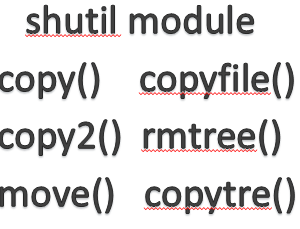- Random module is used to generate pseudo-random number.
- Random module consist on different built in function but most widely used random functions is menion below.
random()
- It Generate pseudo-random float numbers.
- The statement random.random() method return the floating point number that is in the range of [0, 1) but not including 1.0.
- Takes no positional argument.
Syntax-random.random()

randrang()
- It chooses an integer and define the range in-between.
- randrange can take more than one argument randrange(start, stop, step)
- randrange(a,b) will return a<=value< b
- Generate the random number within specified limit.
Syntax –random.randrange(start, stop [, step])

randint()
- Generate the random number within specified limit.
- It will return a<=value<= b.
- List object can not be used.
- Takes 2 positional arguments.
- Used when we know the start and end values.
Syntax-random.randint(start, stop)

uniform()
- It chooses a floating point number that is defined in the range.
- It takes two parameters.
- This function generates a random float number which is greater than or equal to the start number and less than or equal to the stop number.
Syntax-random.uniform(start, stop)

choice()
This method introduced in python version 3.6 and it can repeat the elements.
- It is used when you want to select an item at random in a given range or a list or something that is iterable.
Syntax-random.choice(iterable element)

seed()
- This function is used to generate the fixed value each time.
- This is very helpful when we are working in testing envirnoment before production.
Syntax- random.seed(number)

This is a short description about random function and its implementation I think you enjoyed this post .if you have any query related to this post then let us known in the comment section.
Happy Learning!!

